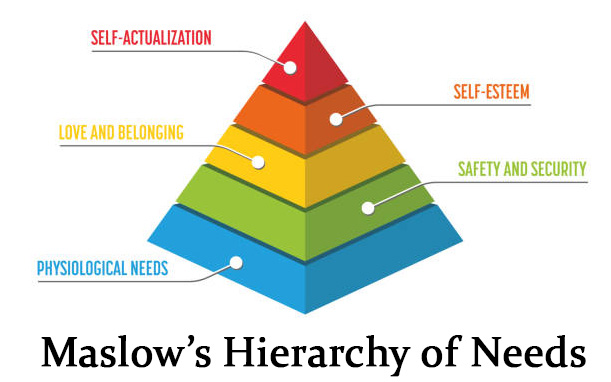Let’s embark on a transformative journey with Karl Lehmann’s “Money, Mind & Meaning,” where finances become a gateway to unlocking your deepest desires. Beyond typical money matters, Lehmann invites you to explore the boundless realm of personal fulfilment intertwined with wealth. Prepare to be intrigued as you uncover the intricate relationship between money and meaning, paving the way for a richer life filled with purpose and satisfaction. Here are some of the key ideas mentioned in the book:
Key Idea No. 1: Maslow’s Pyramid of Needs

Understanding what truly motivates us and drives our behavior is crucial for leading a fulfilling life. One of the most influential frameworks for understanding human needs is Abraham Maslow’s Hierarchy of Needs. This pyramid-shaped model categorizes human needs into five distinct levels, each building upon the other to ultimately lead to self-actualization.
At the base of Maslow’s hierarchy are our physiological needs – the essentials required for survival, such as food, water, and shelter. Without meeting these basic needs, it’s challenging to focus on anything else. Ensuring that we have access to these necessities is the first step toward personal fulfillment.
Moving up the pyramid, we encounter safety needs, which include physical safety as well as stability and security in our environment. Feeling safe and secure in our surroundings is essential for overall well-being. Taking steps to enhance our safety, whether through home security measures or stable employment, is crucial for progressing toward higher levels of fulfillment.

The third level encompasses social needs, such as belongingness and connection with others. Meaningful relationships with friends, family, and colleagues contribute significantly to our happiness and sense of fulfillment. Nurturing these relationships and actively seeking out social connections is vital for overall well-being.
Esteem needs come next, involving feelings of accomplishment, recognition, and respect. Feeling valued and respected in our personal and professional lives is essential for building self-esteem and confidence. Setting goals to achieve personal milestones and seeking recognition and growth opportunities can help fulfill these esteem needs.

Finally, self-actualization represents the pinnacle of Maslow’s hierarchy – the realization of one’s fullest potential and pursuit of personal growth. Living in alignment with our values and passions and actively pursuing our goals and aspirations are essential for reaching this level of fulfillment.
In conclusion, Maslow’s Hierarchy of Needs provides a valuable roadmap for personal growth and fulfillment. By assessing where we stand in each level of the pyramid and taking actionable steps to address any deficiencies, we can pave the way for a more satisfying and meaningful life. Remember, the journey toward self-actualization is ongoing, but each step brings us closer to realizing our fullest potential.
Key Idea No. 2: SMART Goal Mastery
Setting personal goals is crucial for achieving success and fulfilment in life. However, it’s not just about setting any goals; it’s about setting SMART goals. The SMART framework stands for Specific, Measurable, Achievable, Results-focused, and Time-bound. Let’s break down each component to understand how it can help you achieve your goals effectively:
- Specific: When setting goals, it is crucial to be specific about what you want to achieve. Vague goals, such as “I want to be healthier,” lack clarity and direction. Instead, clearly define your objectives. For example, instead of aiming to “exercise more,” set a specific goal such as “going for a 30-minute jog every morning.”
- Measurable: Goals should be measurable so that you can track your progress. For example, if your goal is to save money, you could set a specific amount to save each month. Measuring your progress keeps you motivated and helps you stay on track towards achieving your goal.
- Achievable: While it’s important to aim high, it’s also crucial to set goals that are realistic and attainable. Setting overly ambitious goals can lead to frustration and demotivation. Instead, consider your resources, capabilities, and constraints when setting your goals to ensure they are achievable.
- Results-focused: Your goals should focus on the results you aim to achieve. Consider why you want to reach a specific goal and how it will benefit you. This mindset will help you remain motivated and focused on your goal, even in the face of challenges.
- Time-bound: Setting a deadline for your goals creates a sense of urgency and helps you stay committed. Without a deadline, it’s easy to procrastinate and lose sight of your goal. Setting a realistic timeline for achieving your goals will keep you on track and motivated to succeed.
In conclusion, setting SMART goals is essential for making meaningful progress in various areas of our lives. By being specific, measurable, achievable, results-focused, and time-bound, we can set clear objectives that inspire action and drive us towards success. So, let’s harness the power of the SMART framework to turn our aspirations into reality and create the life we desire.
Key Idea No. 3: Supercharge Your Routine
Habits are powerful forces that shape our lives. They influence our daily decisions, with studies suggesting that as much as 95% of our choices are habit-driven. This underscores the importance of cultivating positive habits that align with our goals and aspirations.

One of the challenges on the road to success is boredom. When our habits become routine and uninspiring, they can lead to a lack of motivation. To counter this, it’s crucial to surround ourselves with positive influences. This could mean seeking out mentors or spending time with people who uplift and motivate us.
Seeking personal growth is also essential on the path to success. This could involve learning new skills, taking on new challenges, or stepping out of our comfort zones. By continuously seeking to improve ourselves, we can stay motivated and focused on our goals.
Self-care is another crucial aspect of leading a fulfilling life. It’s important to take the time to recharge and rejuvenate ourselves regularly. Whether it’s through exercise, meditation, or simply spending time with loved ones, finding what works for us and making it a priority can have a profound impact on our overall well-being.
Key Idea No. 4: Boost Your Finances
When it comes to improving your financial situation, small changes can add up to big rewards. One of the best ways to start is by paying yourself first. Before you pay your bills or expenses, set aside a portion of your income for savings. Aim for around 10-15% of your earnings and consider setting up automatic transfers to make it easier. This simple habit can help you build a financial cushion and prepare for unexpected expenses.

Another key strategy is to take advantage of compound growth. This means reinvesting your earnings to generate additional income over time. The earlier you start investing, the more time your money has to grow. Even small, regular contributions can add up significantly over the long term.
Changing your attitude towards money can also have a big impact on your financial future. Instead of viewing saving as a chore, try to see it as a way to achieve your goals and secure your financial freedom. Set specific, achievable goals for yourself, whether it’s building an emergency fund, saving for a vacation, or investing in your future.
Finally, consider implementing dollar cost averaging as a strategy for investing. This involves investing a fixed amount of money at regular intervals, regardless of market conditions. By spreading out your investments over time, you can reduce the impact of market volatility and potentially increase your returns.
In essence, improving your personal finances isn’t just about following a set of rules; it’s about embracing a mindset shift and adopting sound financial practices that can set you up for success.
Key Idea No. 5: Swim Against the Tide

Research shows that humans have a natural tendency to focus more on negative experiences than positive ones. It’s like our brains are wired to spot danger and avoid pain at all costs. While this may have been helpful for our ancestors navigating harsh environments, in today’s world, it can lead to unnecessary stress and anxiety.
Now, let’s apply this concept to investing. The stock market is notorious for its ups and downs, and it’s easy to get swept up in the frenzy of daily fluctuations. But here’s the thing: successful investing is all about maintaining a positive mindset and thinking long-term.
So, how can you cultivate this positive mindset and make smarter investment decisions? Here are a few actionable tips to get you started:

- Embrace the Long-Term Perspective: Rather than getting bogged down by short-term market fluctuations, focus on the bigger picture. Investing is a journey that spans years, if not decades. By adopting a long-term mindset, you can ride out temporary setbacks and stay on course towards your financial goals.
- Stay Informed, but Don’t Obsess: It’s essential to stay updated on market trends and developments. However, constantly checking your investment portfolio can lead to unnecessary stress and anxiety. Set aside dedicated time each week to review your investments and make informed decisions without becoming consumed by daily fluctuations.
- Avoid impulsive decisions: When the market experiences volatility, it’s easy to panic and make rash decisions. However, acting on impulse can often do more harm than good. Before making any investment decisions, take a step back, assess the situation calmly, and remind yourself of your long-term goals.
By adopting a positive mindset and focusing on the long-term, you can navigate the ups and downs of the stock market with confidence. So, the next time you find yourself worrying about market fluctuations, remember: stay positive, stay informed, and stay the course. Your future self will thank you for it.
In conclusion, “Money, Mind & Meaning” is a compelling guide that transcends mere financial advice, offering readers of all ages a pathway to personal growth and empowerment. Get a free copy of this book on Amazon Kindle by clicking here.

Leave a Reply